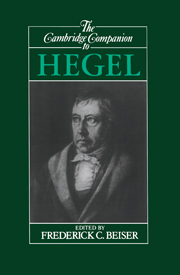Book contents
- Frontmatter
- Introduction
- 1 Hegel's intellectual development to 1807
- 2 You Can't Get There from Here
- 3 Hegel's conception of logic
- 4 Hegel's idealism
- 5 Hegel's dialectical method
- 6 Thought and being
- 7 Hegel's ethics
- 8 The basic context and structure of Hegel's Philosophy of Right
- 9 Hegel's historicism
- 10 Hegel on religion and philosophy
- 11 Hegel's aesthetics
- 12 Transformations of Hegelianism, 1805-1846
- 13 Hegel and Marxism
- 14 Hegel and analytic philosophy
- Bibliography
- Chronology
- Index
1 - Hegel's intellectual development to 1807
Published online by Cambridge University Press: 28 May 2006
- Frontmatter
- Introduction
- 1 Hegel's intellectual development to 1807
- 2 You Can't Get There from Here
- 3 Hegel's conception of logic
- 4 Hegel's idealism
- 5 Hegel's dialectical method
- 6 Thought and being
- 7 Hegel's ethics
- 8 The basic context and structure of Hegel's Philosophy of Right
- 9 Hegel's historicism
- 10 Hegel on religion and philosophy
- 11 Hegel's aesthetics
- 12 Transformations of Hegelianism, 1805-1846
- 13 Hegel and Marxism
- 14 Hegel and analytic philosophy
- Bibliography
- Chronology
- Index
Summary
Georg Wilhelm Friedrich Hegel was born in Stuttgart on 27 August 1770. He was the eldest son of a senior financial official in the administration of the duchy of Wiirttemberg; the family belonged to the “notables” of the duchy. He was a serious and clever child. His mother (who gave him Latin lessons before he went to school) may have hoped he was destined for the Church; his father probably hoped for a successor in the civil service.
By the time his mother died in September 1783, Hegel was keeping a diary full of academic matters in which he practiced his Latin. He was first in his class every year at the Stuttgart Gymnasium. At about the time that he passed to the upper school (autumn 1784), Hegel began to organize his own private studies “encyclopaedically.” He copied out long excerpts from the books that he read under headings and subheadings, which indicate a Baconian ambition to organize all knowledge under its proper “science. ” He continued this habit until after he entered the Theological Institute at Tubingen in October 1788. He never lost the habit of reading with pen in hand, and we have “excerpts ” from all periods of his life; but at Tubingen he stopped writing his classificatory headings at the top of the page. Since he kept his schoolboy collection all his life, his biographer, Rosenkranz, was able to describe it in some detail. A small part of it survived and was printed by Gustav Thaulow in 1854 (see Dok . . ., pp. 54-166).
- Type
- Chapter
- Information
- The Cambridge Companion to Hegel , pp. 25 - 51Publisher: Cambridge University PressPrint publication year: 1993
- 5
- Cited by

